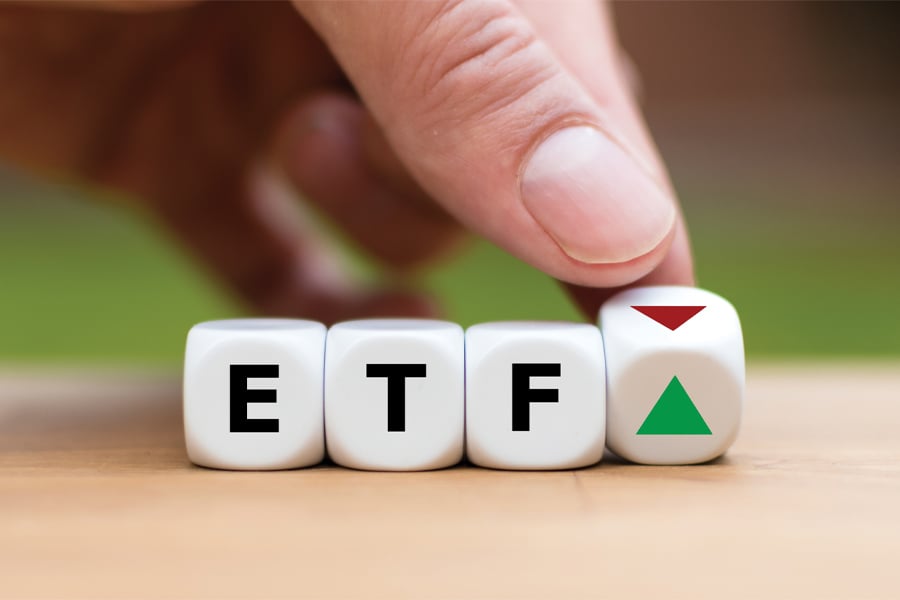

After booming in the anything-goes pandemic era, a once-fashionable investment strategy is falling out of favor anew, hitting some niche ETF providers along the way.
Investors have already yanked nearly $4 billion so far this year from exchange-traded funds investing in themes like clean energy and cloud computing, after withdrawing $4.6 billion from such funds as a whole in 2023, according to Bloomberg Intelligence.
Thematic allocations were all the rage during the stay-at-home trading boom three years ago, when interest rates were at historic lows. Now money managers can earn nearly 5% by simply parking their money into cash-like instruments, while demand for market-leading growth companies is being met by Big Tech funds like QQQ, up more than 8% this year alone.
All that’s diminishing the appeal for often-unprofitable companies that ride disruptive technologies of tomorrow — many of which make up thematic portfolios — while forcing specialist providers to shutter funds or retool their offerings. Defiance ETFs has culled nearly half of its lineup since it was founded in 2018, according to Bloomberg Intelligence. Global X, earlier this year, liquidated around 20% of its suite. First Trust’s 29 thematic ETFs have garnered $55 million this year, compared to nearly $2.3 billion for the whole of 2021.
“For many of these thematic ETFs — because they’re high growth, because they’re scaling, because they’re made up of more unprofitable companies than just a market index — I do think rates have a bigger impact, for better or for worse,” said Ryan Issakainen, First Trust’s senior vice president and ETF strategist.
The market had expected the Federal Reserve to cut rates more aggressively than now seems likely, leading to a resetting of expectations for some companies that these funds hold, he added.
Among those feeling the shift away from thematic funds is Defiance ETFs. Bloomberg Intelligence’s Athanasios Psarofagis says that even though the churn ratio — closures as a percentage of launches — is generally elevated among small issuers, Defiance’s figure is higher than average.
Another metric where Defiance lags the fund industry is the average lifespan of an ETF before it’s liquidated, according to BI data. For Defiance, that number is about a year, compared to an industry average of 4.7 years over the past five years. So far in 2024, the issuer has garnered $128 million across its suite of 10 funds, with the $157 million Defiance R2000 Enhanced Options Income ETF (ticker IWMY) attracting nearly 75% of those assets.
Defiance CEO Sylvia Jablonski says it’s harder for smaller issuers to keep funds that struggle to gather assets afloat for longer, adding that closures are par for the course because not all ETFs will be a big hit.
“If the market tells us that there’s no interest in this product and that’s dictated by assets under management, then we simply have to understand that either the timing wasn’t right or it wasn’t what the market was looking for,” she said in an interview.
Undeterred, Defiance has filed for at least a dozen more funds recently, including an ETF that tracks twice the inverse of the performance of ether, the second-largest digital asset. Last week, it launched the Defiance Oil Enhanced Options Income ETF (USOY), a new fund focusing on the oil industry.
To be sure, not all fund shops struggling to garner flows are dealing with a spike in closures. First Trust, for example, has shuttered only 5% of some 250 ETFs it has ever launched, according to BI data. Meanwhile, the 19 funds that Global X closed earlier this year made up only 1% of its total assets under management.
Like Jablonski, Global X’s Pedro Palandrani said closures are to be expected in the ETF industry. About 36% of the ETFs that Global X has ever launched have shut down, according to BI. The firm has hauled around $3 billion across its more than 90 funds so far this year; inflows for the whole of 2021 were $21.18 billion.
Palandrani is optimistic that thematic ETFs will gain favor again as emerging technologies become more relevant.
“It’s important to stay dynamic,” Palandrani, director of research at Global X, said in an interview. “If the info we have toward that high-conviction theme changed, we should respond.”
Drew Pettit, director of US equity strategy and ETFs at Citi Research, said it might take some time for investors to get comfortable with thematic investing again. “The reason thematic is struggling for now is there’s a lot of investors that haven’t shaken off the scar tissue from investing and potentially over allocating to some of these really high-beta themes that turned out to be what we call micro-bubbles,” he said.

Relationships are key to our business but advisors are often slow to engage in specific activities designed to foster them.

Whichever path you go down, act now while you're still in control.

Pro-bitcoin professionals, however, say the cryptocurrency has ushered in change.

“LPL has evolved significantly over the last decade and still wants to scale up,” says one industry executive.

Survey findings from the Nationwide Retirement Institute offers pearls of planning wisdom from 60- to 65-year-olds, as well as insights into concerns.
Streamline your outreach with Aidentified's AI-driven solutions
This season’s market volatility: Positioning for rate relief, income growth and the AI rebound
